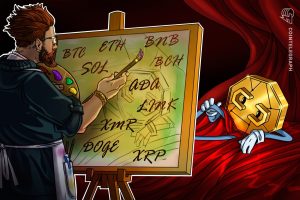Sparking the latest mystery surrounding Bitcoin Ordinals, someone airdropped 21,000 digital inscriptions as a part of an apparent game promotion on Sunday.
“A technological arms race has begun—21,000 cutting-edge RSICs, manufactured in our factory, are being sent from our distribution centers to the Ordinals community,” a message inscribed in inscription 56,754,110 reads. “The RSICs are designed for the sole purpose of securing a bag of runes. These runes will be etched in our foundry after the runes protocol launches on Bitcoin.”
While the group behind the airdrop calls itself Runecoin, it appears unrelated to the Runes concept designed by Ordinals’ original developer, Casey Rodarmor, last year.
The Runecoin rules establish the backstory: all 21,000 RSIC inscriptions were initially manufactured but can no longer be produced due to a “mysterious explosion of the factory and distribution centers.” These RSICs are being airdropped to the Ordinals community, giving RSIC holders three options: mine runes, sell RSICs on the market, or let their RSICs fade. Runecoin said 10% of the RSICs are reserved for the game’s designers.
Adding more mystery to the game is that the parent inscription only reads “deploying more inscriptions.”
Last week, a message on the Bitcoin blockchain contained a riddle that caused considerable buzz in the Ordinals community.
“10,000 sats, side by side,” the message found in Ordinals inscription 55,365,041 reads. “A single UTXO, untouched inside. Born together, cursed at heart. Built with code, Bitcoin Art.” The mysterious message was followed by a string of numbers: 391481082118 – 391481092117.
The inscription “game” drew excitement from some of the Ordinals faithful, with over 33 BTC, around $1 million in volume traded so far, according to Magic Eden. Others, however, questioned the airdrop’s claims and how it was advertised on social media.
“Although the RSIC approach is novel and unique there is absolutely no guarantee this will be the first ever rune, nor does this team have any clue to what the final protocol will look like,” crypto podcast host and product manager at Emblem Vault Jake Gallen wrote. “Unless this is actually @rodarmor behind it.”
A core contributor to BRC-20 platform Omnisat, Gallen—like many others—can only speculate as to who is behind Runecoin, saying that calling the airdropped inscriptions “runes” misrepresents the reality of what a potential buyer is getting.
“This can cause a lot of harm to new buyers who don’t know what they’re getting into when they’re buying an inscription,” Gallen told Decrypt in an interview. “They think it’s a rune, even though [Runes Protocol] is not live for another three months.”
While Gallen’s previous statements on social media have been called “FUD,” he emphasized the importance of transparency and providing all available public information for informed decision-making. He expressed concern about users engaging in activities without full knowledge, advocating against such uninformed actions.
“You can call this FUD or whatever you want, but the truth is the marketing behind this is just not true,” Gallen continued. “This entire post can be disproven, of course, but if you are going to play this game please [do your own research] DYOR and ensure you understand the entirety of what’s being presented before aping your sats.”
“The way the RSIC airdrop by @rune_coin was done is really neat, and I hope airdropping to the Ordinals community becomes a trend, but this type of marketing needs to be called out,” pseudonymous NFT historian and Ordinals collector Leonidas tweeted.
Calling it a red flag, Leonidas cautioned that Ordinal enthusiasts should wait until the release of the Rune protocol before diving into a project using that name.
“It obviously is not the first Rune on Bitcoin, and Casey has stated multiple times that no Runes are Runes until the protocol actually drops and a first Runes token is actually minted to the chain,” Leonidas said. “I strongly dislike that RSIC is marketing itself in this way and especially dislike that it will mostly mislead ‘average’ people in the Ordinals community who don’t spend the time to fully understand why a claim like this is blatantly false.”
Adding even more confusion to the airdrop, the Runecoin Twitter account said the runes protocol has not been launched yet, and no runes have been etched.
“We think this is a fun distribution mechanism, which could be used for many things, including runes, and wanted to experiment and have fun with it. We hope you will too,” the Runecoin account said.
Edited by Ryan Ozawa.
Stay on top of crypto news, get daily updates in your inbox.
















